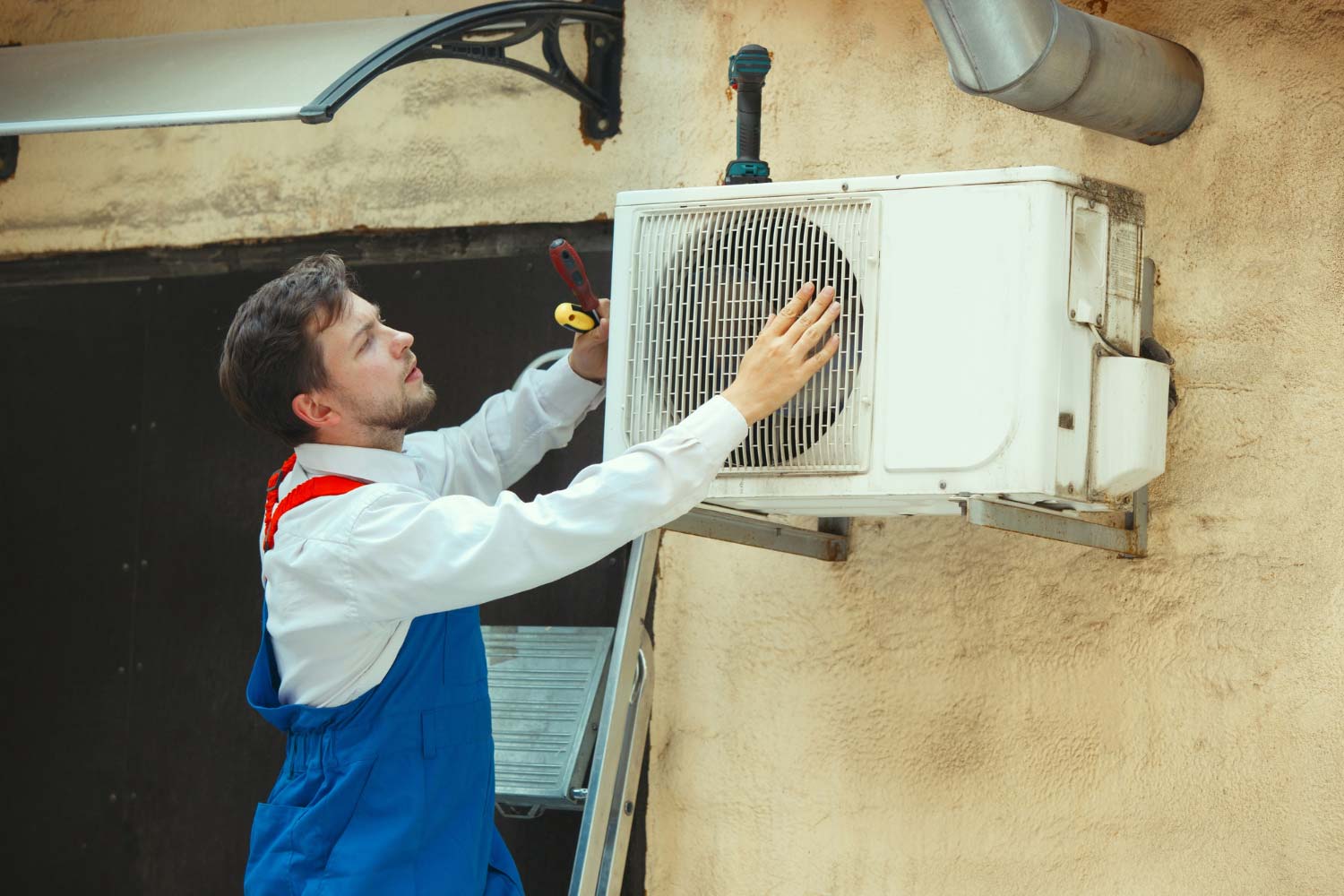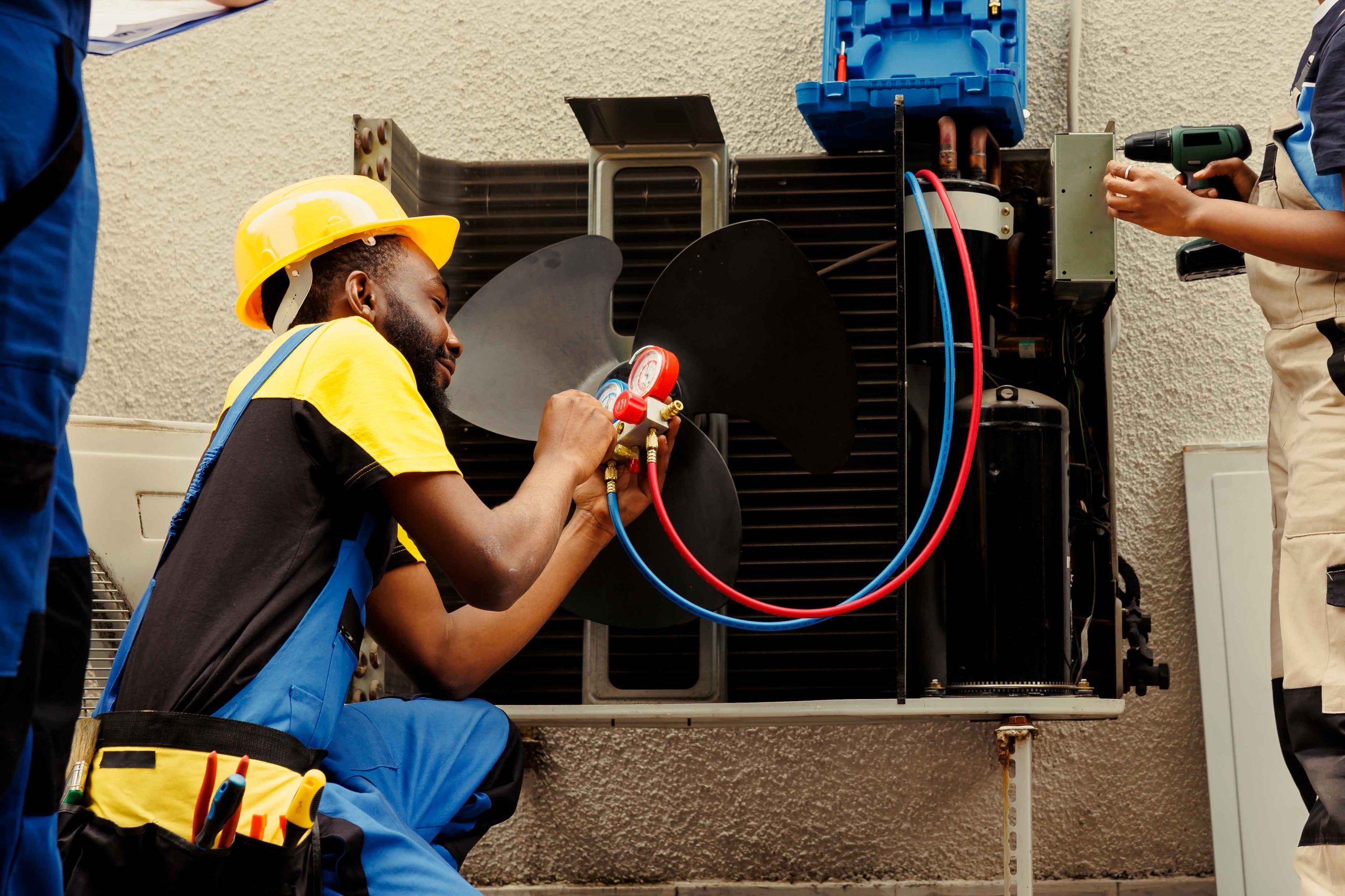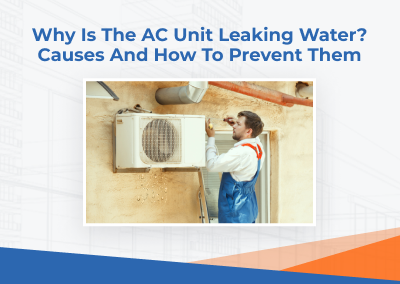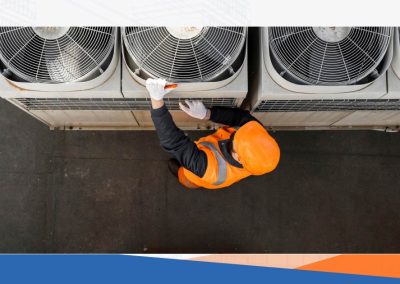Air conditioners and HVACs not only ensure optimum home comfort but also to lead a healthy life. However, to enjoy a well-functioning HVAC system, regular maintenance, and timely repairs are key.
Ignoring small issues can lead to more expensive problems down the line. Curious thinking: when do you repair your AC, or how do you repair your air conditioner? Or do you hire a technician for repair and replacement?
Well, don’t be panic. We’ve come up with a comprehensive guide to air conditioner repair where you’ll experience all key hacks to keep your space comfortable, such as:
- The benefits of air conditioner repair
- Common air conditioner problems
- AC compressor repair guidelines
- Air conditioner changing hacks
- Air conditioner freon leak repair guide
- Top-rated AC repair and replacement company in Columbus, and more.
So, what are you waiting for? Let’s dive together!
What are the Advantages of Regular Air Conditioner Repair?

Regular AC maintenance and repair improve your comfort, efficiency, and overall well-being. Here are some key benefits of AC repair:
- Optimal performance: A well-maintained air conditioner provides a soothing and refreshing cooling environment throughout the summer months.
- Longevity: A properly functioning air conditioner operates perfectly and ensures a long lifespan.
- Return on investment: Regular maintenance helps you to address potential issues and prevent costly emergency repairs.
- Reduced energy bills: A properly functioning air conditioner operates efficiently and helps to reduce energy costs.
- Improve air quality: A clean and comfortable indoor temperature can contribute to better health by reducing allergies, and other issues.
- Eliminate extra noise: A clean air conditioner eliminates noises, like buzzing or hissing sounds, and introduces you to a peaceful and relaxing experience.
What are the Causes of Air Conditioner Problems?

The air conditioner is a common household appliance that makes summer days enjoyable. But sometimes you may notice your AC starts acting up and gives you lots of work to deal with, such as:
- Water leakage: The most common air conditioner problem is water leakage. This might happen due to a blocked drain line or a frozen evaporator coil. If you clean the drain line and air filters and check refrigerant levels, you can avoid these issues.
- High energy bills: Do you notice a sudden spike in your energy bills? It might happen due to poor maintenance, dirty filters, or an AC unit aging system.
- Strange noises: Do you notice buzzing, rattling, or banging noises? If so, they may be caused by loose parts or electrical problems, such as circuit breakers or electrical connections.
- AC not turning on: If your AC doesn’t turn on, it could be due to a tripped circuit breaker, thermostat issues, or problems with electrical connections.
- Bad odors: When you experience unpleasant smells from AC, it can be concerning and uncomfortable. These bad smells can come from different sources, like mold growth, dirty filters, or drainage systems.
- Tripping circuit breaker: Does your AC keeps tripping the circuit breaker? If so, it might happen due to an overloaded circuit, dirty coils, or malfunctioning compressor.
- AC unit freezes up: When an air conditioner freezes up, this issue arises due to your airflow restrictions, low refrigerant, or a malfunctioning blower fan.
- Short cycling: Does your AC turn on and off frequently? Malfunctioning thermostat issues, an oversized unit, or refrigerant problems can cause this AC problem.
- AC running constantly: If an AC runs continuously without shutting off, it can lead to high energy bills and damage the system. This problem arises due to a thermostat, dirty coils, or an AC refrigerant leak.
- AC stops producing cold air: Another the most common issue homeowners and businesses face is that the air conditioner stops producing cold air. This might happen due to dirty air filters, low refrigerant levels, or thermostat issues.
How to Repair Air Conditioner Compressor?

The AC compressor is located in your central air conditioning system in the outdoor unit. So, to repair your AC compressor, you need to:
Step 1: Diagnose the AC System’s Operation
Before starting repair work, ensure that the problem happens from the compressor. For this, you can take a look at some symptoms, such as:
- AC is producing warm air.
- Strange noises coming from the AC, like banging, rattling, or others.
- The compressor isn’t working well, like not turning on or tripping the circuit breaker.
- Refrigerant leaks.
- Contaminants or debris inside the compressor.
- Burnt or broken electrical connections.
After ensuring the connections and refrigerant levels and measuring the compressor’s voltage, it’s time to move on to the repair process.
Step 2: Turn off the Power and Isolate the System
The next step is to turn off the power supply to the AC unit from the main circuit breaker. Also, disconnect the outdoor unit power supply to avoid any accidental issues. If you notice any visible damage or leaks, it may be necessary to replace the compressor.
Step 3: Inspect the Compressor
Inspect the capacitor, contactor, and fuses that are connected to the compressor. If any of these parts are damaged, they might prevent the compressor from working.
Step 4: Repair or Replace Damaged Parts
If the issue is repairable, try to make the necessary repairs. Otherwise, replace the compressor with a modern and compatible model.
Step 5: Test and Reassemble
After reinstalling the compressor, reconnect the electrical connections and test the unit to ensure it works perfectly.
How to Change Air Conditioner Filter?
The AC filter is designed to filter out particles and pollutants, which is crucial for extending your HVAC system. Let’s check out the four easy steps for changing the air conditioner filter!
- Turn off the power
Safety first! Before you start your HVAC filter replacement process, turn off the power to your unit to avoid any electrical shocks. To do this, you can flip a switch on the side of the unit.
- Locate your filter.
The second step is to locate your HVAC filter. The filter location depends on what kind of AC system you use. The two most common places of filter locations are the air return vent and the air handler/furnace.
- Remove the old filter.
This step is so simple. The filter will be placed inside the AC unit. So, remove the cover first and slip the filter out. If it looks clean, you can gently dust it off and place it again. But if it’s full of dust and debris, then replace it.
- Insert the clean or new air filter.
When you insert the new or clean filter, you’ll need to align it in the same positions as the old one. To do this, look for the arrows that signify the airflow direction and ensure the arrows point toward the AC unit and away from you. Also, don’t forget the set reminders for the next replacement.
How to Repair a Freon Leak in Air Conditioner?
A freon or refrigerator can leak due to various reasons, such as corrosion, damaged seals, mechanical damage, and more. Hire a professional and certified technician who will help you with freon leak repair, such as:
- Identify the common signs of a freon leak, including AC blowing warm air, Ice forming, noises, higher energy bills, and others.
- After identifying the issue, turn off the AC system from the main circuit breaker.
- Now, locate the leak through an electronic leak detector, ultraviolet dye, soap, and water solution.
- Determine the exact location of the leak, like evaporator coil, condenser coil, refrigerant lines, valves, or joints.
- Once you locate the location, repair the leak by considering the severity and location. For example, tighten loose connections for the leaks of a valve or fitting, replace damaged components, braze, etc.
- After repairing the leak, evacuate the system and recharge with the correct refrigerator.
- Another more important part is must retest the system to prevent future leaks.
Is it Worth Repairing an Air Conditioner?
Yes, it is worth repairing the AC conditioner for the system’s overall efficiency. Before fixing the AC, you must consider several factors, such as:
- AC unit age: Do your AC unit is less than 10 years old? It is worth repairing because AC units lose efficiency and cause more frequent breakdowns after 10-15 years.
- Repair vs. replacement cost: If you have minor issues, AC repair is more cost-effective than replacement. But for expensive components, like compressors, condensers, or others, it’s wise to invest in a new system to get long-term savings.
- Type of AC issues: If you face minor fix issues, like a clogged filter, thermostat problems, or electrical issues, it’s worth repairing. However, significant failures, like evaporator coils, condensers, or others, can be expensive to repair.
- Warranty coverage: If the AC unit is under warranty, repair costs may be lower. But if your warranty is out of the day, repair costs might be high. So, the best solution is a replacement, which may be a better long-term investment.
- Frequent breakdowns: Does your AC require multiple repairs in a short period? If yes, replacement is the best option to save money over time.
- Energy savings and efficiency: If your AC is older and causing high energy bills due to inefficiency or frequent repairs, it’s better to upgrade to a new system.
- Insufficient airflow: If your AC airflow isn’t working correctly, you can repair it. However, pay attention to the potential reasons behind these issues, like faulty thermostats, compressor issues, or restricted airflow.
However, hire a trusted HVAC company to make in-depth observations and estimate the budget for both repair and replacement.
Where Should You Go for Air Conditioner Repair in Columbus, Ohio?
Thinking about hiring an AC compressor repair company or overall HVAC system repair and installation? Before choosing the random one, pay attention to their service details, technicians’ professionalism, and other factors.
AK Indoor Air Service is the top-rated and best AC repair & installation company in Columbus, Ohio, where you get a dedicated team of skilled and certified technicians, 24/7 customer support, and many more.
Why do you hire?
- Quality installation and repair on time.
- Diverse HVAC solutions that fulfill your needs.
- Budget-friendly pricing structure.
- Round-the-clock customer service and prompt response.
- Latest technologies to serve you the best HVAC services.
- Eco-friendly solutions that impact the environment less, and many more.
Also, you get annual inspections, tune-up AC services, seasonal AC maintenance, consultation, emergency services, and other air conditioning services from certified experts. Contact or book a service now!
How Much Does Air Conditioner Repair Cost?
The most asked question among AC users is: How much does AC repair cost, or does AC compressor repair cost? The answer lies in the type of air conditioner you use, the issue, and the location. By considering those factors, we’ve listed an average cost chart below:
| Repair Type | Average Price |
| Air filter replacement | $5-$25 |
| Drain clog removal | $100-$345 |
| Freon leak repair | $320-$1,515 |
| AC Replacement Part | Average Cost |
| Capacitor | $150-$400 |
| Circuit Board | $70-$600 |
| Compressor | $1,250-$2,895 |
| Condensate drain tube | $100-$200 |
| Condensate pump | $100-$170 |
| Condenser coils | $200-$1,597 |
| Drain pan | $155-$350 |
| Evaporator coil | $200-$2,475 |
| Expansion valve | $100-$697 |
| Fan motor | $70-$695 |
| Fuses and relays | $75-$285 |
| Refrigerant recharge | The price depends on the type of refrigerant |
| Refrigerant Lines | $200-$1,455 |
| Thermostat | $30-$550 |
| Heat exchanger | $145-$1,195 |
| Ignitor | $15-$45 |
FAQs about Air Conditioner Repair
Still, facing a dilemma between AC repair vs. replacement? Check out some of the most frequently asked questions below:
What is the most expensive repair on an air conditioner?
The most expensive repair on an air conditioner is a replacement of the compressor.
Why does an AC unit leak water?
An AC (air conditioner) unit can leak water for several reasons, such as:
- A clogged drain line can be caused by dust, dirt, mold, or sludge
- A dirty air filter or insufficient airflow can cause the evaporator coil to freeze over.
- Damage drain pan can rust or crack and leak out water.
- Broke condensate pump.
- A loose, disconnected drain line.
Why is my AC running but not cooling?
There are different reasons why your air conditioner (AC) is running but not cooling, including:
- Refrigerant leak
- Thermostat issues
- Dirty air filter
- Blocked condenser unit
- Frozen evaporator coil
- Dirty condenser coils, and more.
What fails the most in an AC unit?
There are common failures in an air conditioner (AC) unit, such as:
- Refrigerant leaks
- Dirty air filter
- Dirty condenser
- Failed capacitor
- Broken thermostat, and
- Dirty evaporator.
How long does an AC capacitor last?
An air conditioner (AC) capacitor can last anywhere from 5 to 20 years, but the average is around 10 years.
Which part of AC is costly?
The most expensive part of an air conditioner is replacing the compressor, which costs between $1,425 and $2,500 or more.
Is it OK if the AC leaks water?
No. If AC leaks water under the unit or staining walls, there’s a problem. So, it’s better to turn it off and consult with HVAC professionals as soon as possible.
How to clean an AC drain?
You can use a mixture of vinegar and water, a shop vac, or bleach to clean your AC drain.
How to change the AC compressor?
Changing an AC compressor is a handy task that requires a qualified HVAC technician. Here’s an overview of the process for replacing or changing the AC compressor:
- Turn off the power to prevent any electrical hazards before starting to replace it.
- Hire a licensed technician who helps in recovering the refrigerant from your system.
- Once the refrigerant is removed, the technician will disconnect the old compressor. Before that, don’t forget to disconnect the electrical connections and refrigerant lines.
- It’s time to install the new compressor in the same location as the old one. After that, they will connect the refrigerant lines and electrical connections to the new compressor.
- The technician will evacuate and recharge the system.
- Now, it’s time to test the system to ensure it works properly.
Conclusion
Wrapping up the comprehensive guide to air conditioner repair, you’ve noticed the performance and longevity of your HVAC system depend on regular maintenance. We hope that by going through this guide, you will get all the detailed information and steps to keep your AC functioning.
Hire certified and professional AC repair and replacement technicians to enhance efficiency, the latest advancements in cooling technology, and overall specific requirements.





